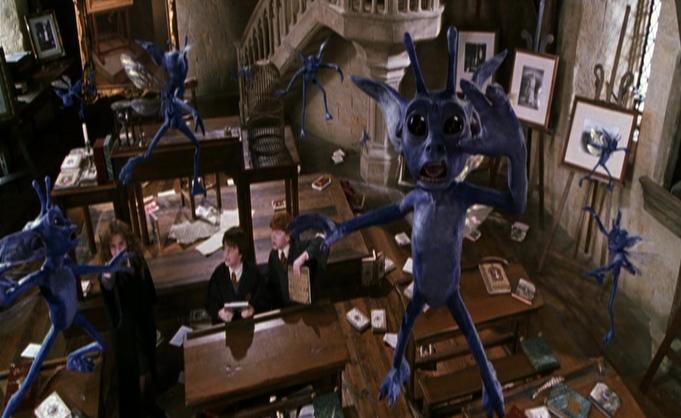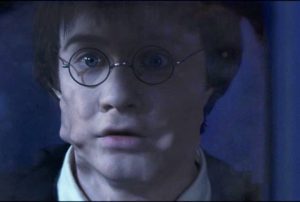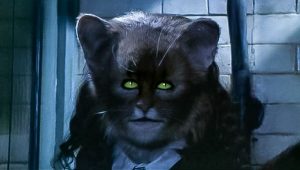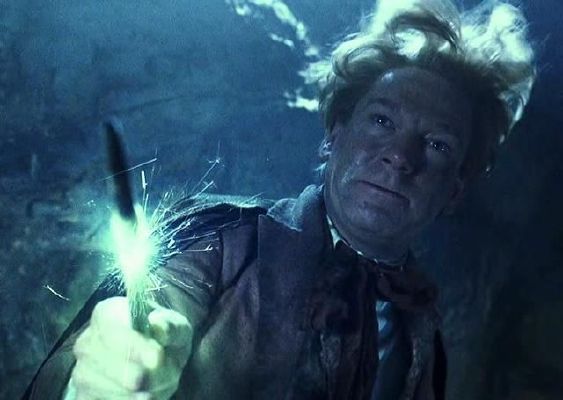
Gilderoy Lockhart: Attempted Murderer
This is Gilderoy Lockhart.

Lockhart is the Defence Against the Dark Arts teacher at Hogwarts in Harry Potter and the Chamber of Secrets. We are first introduced to him at Flourish and Blotts, the bookshop in Diagon Alley where Harry, Hermione and the Weasleys are shopping for textbooks for their second year at Hogwarts School of Witchcraft and Wizardry.[1]
A prolific author, repeated winner of Witch Weekly’s Most Charming Smile Award, and widely considered a heartthrob (looking at you, Molly Weasley), Lockhart is obviously vain but also appears – at first – to be reasonably competent. His books detail his many great achievements: his defeat of the Wagga Wagga Werewolf, his triumph over the Bandon Banshee, and so on.
Alas, the shine quickly wears off, and as the year progresses his ineptitude becomes obvious.

But if he’s so inept, why consider him a killer? He didn’t bludgeon the banshee, or whack the werewolf. Indeed, none of his adventures actually occurred! He’s a liar, maybe, but a murderer?
Let’s step back from Gilderoy for a moment.
In an earlier article, I wrote about persistence and personal identity:
What makes you, you? What could be changed or removed and still leave the ‘youness’ intact? …[W]hat is it that enables you to persist, despite the changes you’ve undergone, from one day to the next?
One of the possibilities I considered was material continuity: in short, that having the same body – or the relevant bits of the same body – is what makes you, you. But early in the Harry Potter series we see that, in the lore of the world Rowling has created, drastic changes to one’s body don’t undermine persistence. For instance, Polyjuice Potion allows one to assume the form of someone else, even if they are of a different gender or a drastically different age.

But we don’t think that Harry-and-Ron-polyjuiced-into-Crabbe-and-Goyle stop being Harry and Ron. We’re not confused as to what’s happening, or worried that our heroes have disappeared. And this isn’t limited to swapping body parts for other human ones: at one point a Polyjuice mishap has Hermione turn into a catgirl.

So if it’s not material continuity that matters for persistence in the Wizarding World of Harry Potter, then it must be something else. A plausible alternative is psychological continuity. The idea, roughly, is that it’s some feature of our psychological makeup that makes us the same person from one day to the next: what feature/s varies by account, but usually it involves some sort of inheritance of beliefs, preferences, dispositions and/or – crucially – memories. Whereas some might locate these features in the brain, in Harry Potter memory is located in the soul:
"You can exist without your soul, you know, as long as your brain and heart are still working. But you'll have no sense of self any more, no memory, no...anything. There's no chance at all of recovery. You just — exist. As an empty shell. And your soul is gone forever...lost."
Remus Lupin, in JK Rowling's Harry Potter and the Prisoner of Azkaban
(I take it that the ‘you’ Lupin is referring to is merely Harry’s body. And as we’ve seen, the body isn’t what’s relevant for full ‘youness’ in Harry Potter. We see another example with those summoned back from death with the Restoration Stone: despite not having physical brains or bodies, they retain the power to think and remember.)
Now Lockhart doesn’t remove souls, but he does tamper with memories. Lockhart has cultivated a single magical skill: Memory Charms. He entices people to tell him their stories and then takes those stories and passes them off as his own. Usually he is selective in which memories he ‘obliviates’ (and there is debate in the fandom about whether memory charms, properly cast, suppress or erase memories).[2] But when confronted by Ron and Harry towards the end of Chamber of Secrets, his attempted erasure is much more significant:
'The adventure ends here, boys!' he said. 'I shall take a bit of this skin back up to the school, tell them I was too late to save the girl, and that you two tragically lost your minds at the sight of her mangled body. Say goodbye to your memories!'
JK Rowling, Harry Potter and the Chamber of Secrets
If what Lockhart is attempting is to erase Harry and Ron’s memories such that that they ‘lose their minds’, and if memories are crucial for persistence, then what he is attempting is tantamount to murder. Harry and Ron – as we know them – wouldn’t survive such a loss.

Thankfully, the spell backfires, and so the murder is merely attempted. In backfiring, though, the spell hits Lockhart instead, erasing – seemingly permanently – his own memories, and leaving behind a body with wavy golden hair, the knowledge of how to write in cursive and a penchant for signing autographs. If these are not enough for persistence, then Lockhart’s final victim was himself.
Footnotes
[1] In person, at least. A copy of Gilderoy Lockhart’s Guide to Household Pests is found at the Burrow (Chamber of Secrets, p. 32)
Further Reading
For more on the persistence question, including further reading, see "On Persistence and Memory"
If you're interested in Harry Potter more generally, we have both philosophical and linguistic musings on the matter.
No comments
Start the conversation…